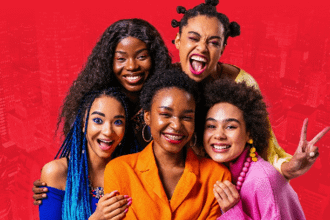South African president Cyril Ramaphosa met senior leaders of Johannesburg and Gauteng, the province it’s located in, in March 2025 to discuss ways to arrest the steep decline in South Africa’s largest city.
Ramaphosa announced a two-year-long presidential intervention to tackle some of the city’s most pressing issues. It is to be led by the Presidential Johannesburg Working Group with eight cross-governmental and multi-stakeholder workstreams.
Johannesburg was established 130 years ago, where the world’s largest-ever gold deposits were discovered. It grew rapidly in the early 20th century and became the country’s economic heartland and largest population centre. Like all South African cities, it was deeply scarred by apartheid policies. People were divided by racially defined groups. Good services and a strong economy benefited a minority, and a black majority were pushed into impoverished ghettos.
But, for about the first two decades of post-apartheid rule from 1994, Johannesburg led the country with innovation and progressive change. It pioneered the new local government system, institutional reforms, new practice on city strategy and planning, pro-poor service delivery, and modern transport infrastructure.
Today, however, the city is in a dire state. Over the past decade, roughly coinciding with the arrival of messy coalition governance in 2016, sound political leadership, administrative stability and financial management have crumbled. Underinvestment in infrastructure maintenance has led to collapsing services. Public trust is deteriorating among increasingly frustrated communities. This was evident in local election results. It also shows up in recent data released by the Gauteng City-Region Observatory on public trust in local government.
The local economy has stagnated. The city’s official unemployment rate of 34.3% is higher than the national average of 32.9%. Mounting joblessness and dwindling incomes have intertwined with depleted trust to knock levels of payment for property rates and service charges. In turn this has deepened the financial and service maintenance crisis.
Corruption in many parts of the city is an endemic complicating factor.
The presidential intervention is designed to address this complex interplay between embedded legacies and failings post-apartheid. The workstreams involving city officials and concerned stakeholders are generating ideas for priority actions. There is also a new energy in the city government, with the executive mayor and members of his mayoral committee making turnaround promises.
This long overdue attention is heartening. But some caution is called for. While some “quick wins” are needed, there will be no easy turnaround. The best prospect is likely to be a process of recovery that will require patience and methodical attention over the long term. A city cannot be repaired in the way an automobile can. A city has a trillion moving parts and is in a constant state of makeover, as dynamics of economy, technology, demography, environment, society, politics, and more, interact and produce change.
The question is not whether a city is fixed – it can never finally be – but rather what trajectory it is on. For Johannesburg, the question is how to exit the downward spiral and begin the process of reconstruction.
We are a group who previously worked in the City of Johannesburg as officials, who are now academics with decades of experience observing local governance trends and dynamics, or scholars engaged in civil society coalitions or communities mobilising around the crisis. Some of us have been involved in the Presidential Johannesburg Working Group over the last few months.
Our view is that there are four areas needing urgent but sustained attention.
The first is the need for a joint effort across national, provincial and municipal government to resolve the crisis. We are pleased that this has begun. The political leadership in the city (and of the province) failed to grasp the opportunity provided by the post-2024 election national compromises to put together a broad-based government of local unity to lead reconstruction. There is no option now but to pursue an inter-governmental initiative led by national government with the committed involvement of the other spheres.
Only genuine collaboration will succeed.
In this respect, the Presidential Johannesburg Working Group holds promise. But what will be needed is careful, concerted work focused first on short-term priorities. Then, over years, on key structural challenges facing the city.
Second, the city needs civil society in all its forms to hold a careful balance between keeping up the pressure on municipal government, constantly holding it accountable to its residents, and working with government to help it solve problems. The Joburg Crisis Alliance, Jozi-my-Jozi, WaterCAN and similar initiatives are claiming well-recognised and respected voice in the affairs of the municipality.
Johannesburg needs a city government that is open to this scrutiny, accepting the need for transparency, and open to the help that civil society can offer.
To raise the level of accountability and collaboration, a clear programme of restoration has to be communicated openly to the public. Milestones and expenditure requirements need to be set that allow for constant monitoring. There must be open council meetings, and regular online and in-person briefings.
Also required are new mechanisms for citizen-based monitoring. These may include trained citizen monitors reporting on service delivery. Alternatively, the establishment of a sort of “Citizen’s Council” which meets regularly to receive reports from these monitors and the city administration.
International examples include the Bürgerrat model. This is now fully institutionalised in parts of Germany and Austria to strengthen local democracy and accountability. In this model, citizens are randomly selected to sit on a council which monitors performance of local government and provides new ideas.
Another approach could be for civil society organisations to be invited to a Citizen’s Council that would act in support of the oversight processes of the elected Municipal Council.
Third, there has to be a solution to unstable coalition governments. These seem to be structured to facilitate separate political fiefdoms where spoils can be divided in the allocation of portfolios. At minimum, the presidential intervention must provide for a check and balance on processes where bureaucratic appointments and budgetary allocations may serve the interests of cronyism. For example, there should be transparency and rigour in appointments to the boards of Johannesburg’s municipally owned companies.
Regulatory reforms are required in the political arena. This should include rules for the distribution of seats on the municipal executive and the election of mayors. Between January 2023 and August 2024 a tiny minority party held the mayoralty because the larger parties could not agree on a mayoral selection or, more cynically, to ensure that the executive mayor could not call large parties to account.
More importantly, though, there has to be a change in political culture. This is a longer-term process.
Fourth, the problems run far deeper than what bureaucratic reorganisation can achieve.
The longer-term project is to build a capable administration with clear political direction and oversight but insulated from personal agendas and factional battles. The administration became confused and demoralised because of the political instability over an extended period. There are, however, still many capable and committed public servants in the city bureaucracy. The focus should be on working with them to rebuild the administration, making it a place where talent and initiative are recognised and rewarded.
Restored political leadership and a rejuvenated administration is needed for a long term process, extending far beyond the quick wins. This process will involve refurbishing the decaying network infrastructure, restoring financial stability, reestablishing social trust and returning confidence to the city’s economy.
2025 marks 30 years since the first democratic local elections. National government is looking seriously at sweeping municipal reforms. And the next municipal election – likely to be held at the end of 2026 – is an opportunity to make a deep transformation effort. Citizens can ensure that parties contesting the election place Johannesburg’s recovery at the heart of their agenda.

